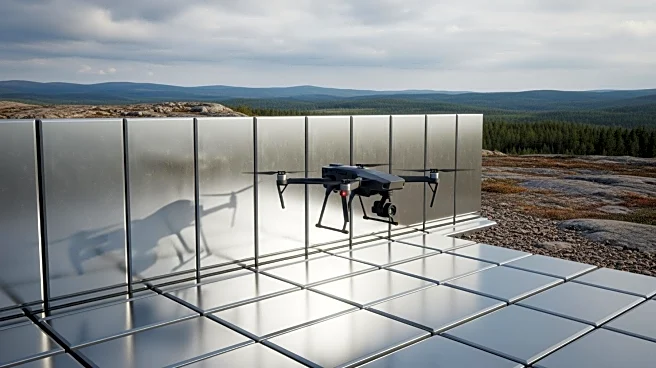What's Happening?
Origin of Latvia and Defsecintel of Estonia conducted a Baltic Drone Wall demonstration at Latvia's Selonia training range. The event showcased Defsecintel's Eirshield counter-unmanned aircraft system
and Origin's Blaze autonomous UAV interceptor. The demonstration involved radar-integrated data enabling early detection and navigation of the Blaze UAV without GNSS. The Blaze UAV performed near-miss intercepts, demonstrating its ability to abort missions and return intact. Additionally, the Beak UAV successfully dropped practice bombs on a target, showcasing precision capabilities. The demonstration highlighted advancements in UAV technology and countermeasures.
Why It's Important?
The demonstration of advanced UAV and counter-UAV technologies is crucial for national security and defense strategies. As UAVs become more prevalent in military operations, the ability to detect and intercept hostile drones is vital. The integration of AI and radar systems enhances the effectiveness of these technologies, providing military forces with improved capabilities to protect airspace and respond to threats. The successful demonstration of precision bombing by UAVs also underscores the potential for these systems to perform targeted strikes, offering strategic advantages in combat scenarios.
What's Next?
Origin plans to begin mass production of Blaze UAV interceptors starting in December, indicating a move towards wider deployment of these technologies. This could lead to increased adoption by military forces seeking to enhance their UAV capabilities. The demonstration may also prompt further research and development in UAV technology, focusing on improving detection, interception, and strike capabilities. As these systems become more integrated into defense strategies, collaboration between technology providers and military organizations is likely to increase.
Beyond the Headlines
The ethical considerations of using autonomous UAVs in military operations are significant, as they raise questions about the role of AI in decision-making and the potential for unintended consequences. The cultural impact of advanced UAV technologies may also influence public perception of military operations, as the use of drones becomes more visible and prevalent. These developments could lead to discussions about the balance between technological advancement and ethical responsibility in defense strategies.











